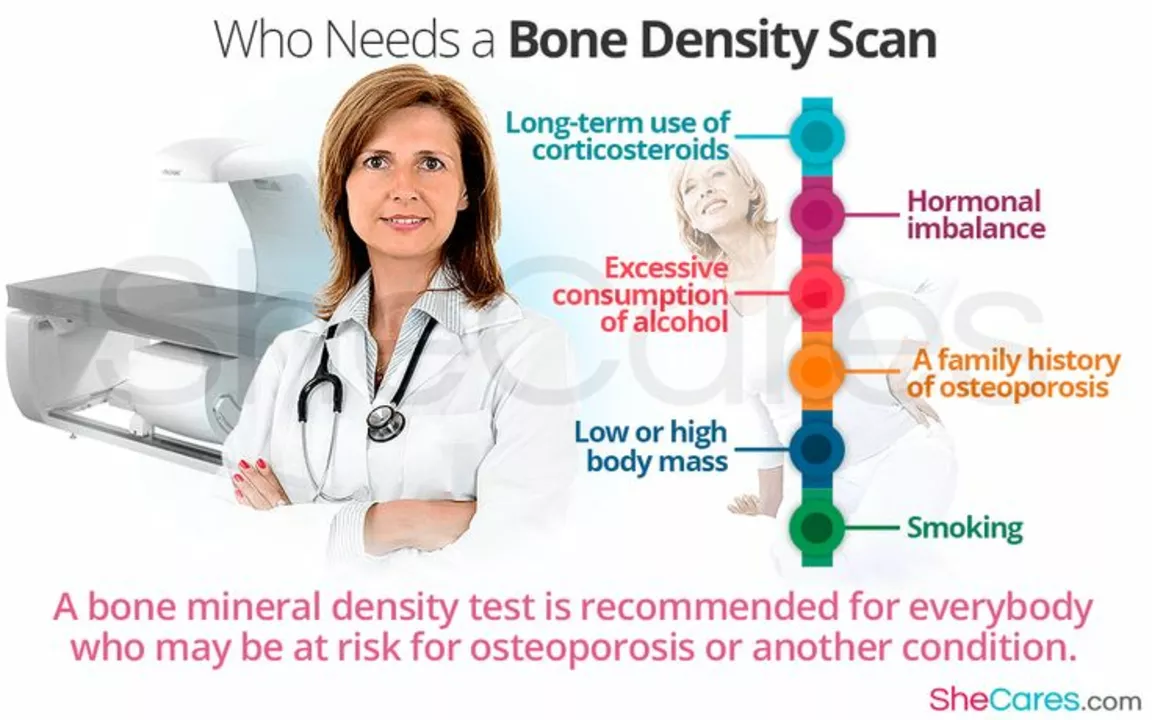Bone density: how to test, protect, and build stronger bones
Bone loss sneaks up on people — one day you’re fine, the next a minor fall causes a break. That’s because bone density drops slowly and pain-free until it doesn’t. If you care about staying active, protect your bones now.
How do you know if your bones need help? Get a simple DXA scan — it measures density at hip and spine and gives a T-score. A T-score of -2.5 or lower usually means osteoporosis; -1.0 to -2.5 is low bone mass (osteopenia). Ask your doctor about when to test — most guidelines suggest testing for women over 65, men over 70, or younger people with risk factors.
What hurts bone density? Long-term steroid use like prednisolone is a big culprit — it speeds bone breakdown and lowers formation. Too much thyroid hormone, heavy drinking, smoking, very low body weight, and low estrogen after menopause also weaken bones. Certain medications for cancer and some epilepsy drugs can affect bone too. If you take chronic meds, ask your provider about bone protection.
How to build and keep bone density: eat enough calcium and vitamin D, but don’t overdo supplements without checking levels. Aim for dietary calcium from dairy, leafy greens, or fortified foods; vitamin D comes from sun exposure and supplements when needed. Protein matters — older adults need enough protein to support bone and muscle. Include magnesium and vitamin K rich foods too.
Move in ways that force your bones to adapt. Weight-bearing exercise like brisk walking, dancing, hiking, or jogging helps the hip and spine. Add resistance training twice weekly — squats, lunges, push and pull movements with bands or weights. Balance work like tai chi or single-leg stands cuts fall risk. Don’t forget posture and core strength.
Medications can stop bone loss or build bone back. Common choices include bisphosphonates (alendronate), which slow breakdown, and newer options like denosumab or anabolic drugs your specialist may offer. Each drug has pros and cons — duration limits, side effects, rare jaw or bone issues — so ask about real-world risks that matter to you.
Quick checklist: get a DXA if you’re in a risk group; eat calcium and vitamin D rich foods; do weight-bearing and resistance exercise; quit smoking and limit alcohol; talk to your doctor if you’re on long-term steroids or high-dose thyroid meds. Small changes add up; consistent effort beats a miracle pill.
When to see a specialist
See an endocrinologist or bone specialist if you’ve had a fragility fracture, very low T-score, or fast bone loss on serial scans. Also seek help if you’re starting long-term steroids or have conditions that harm bone, like inflammatory disease or severe thyroid problems. A specialist can tailor drug choices, monitor side effects, and plan how long therapy should last.
Simple tracking tips
Keep a bone health journal: record DXA results, three key meds, falls, and diet. Ask for a fracture risk estimate (FRAX) to guide treatment choices. Share notes with your doctor. Start today with one small change for bones.

Alendronate: A Miracle Drug for Osteoporosis Management
May 13 2023 / Health and WellnessI recently came across Alendronate, a miracle drug for managing osteoporosis. This medication works wonders in strengthening our bones by slowing down bone loss and increasing bone mass. Not only does it help in preventing fractures, but it also allows those suffering from osteoporosis to lead a better quality of life. The best part is that it's available in an easy-to-take oral tablet form. I can't help but feel grateful for such medical advancements that make life easier for so many people.
VIEW MORE